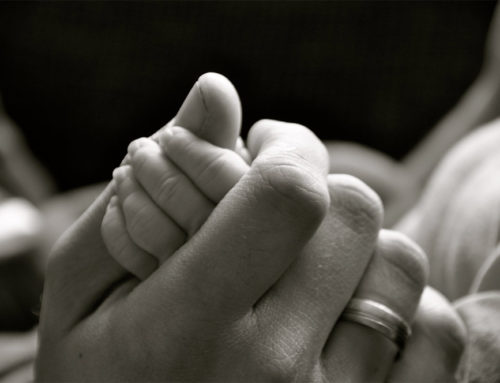“They are infinitely grateful to have been given such a gift. And all the parties coexist in the world happily, because some dared to ask, and some dared say yes. And their children…”
DOWNLOAD THE PDF —> The Gift by Lisa Battalia
OR READ THE REST OF THE STORY BELOW
THIS STORY WAS ALSO PUBLISHED ONLINE AT: http://www.bethesdamagazine.
PUBLISHED ONLINE BY NEW PURLIER REVIEW: http://www.newpurlieureview.
THE GIFT
Miranda bends to pick up the discarded packaging. She scans the expiration date while she sits, tilted forward, on the edge of the toilet seat. Then she looks back at her other hand, at the blue positive sign tucked into the little plastic window. She can see the answer, but the cold of the porcelain seat against her bare bottom is the only thing she can feel. Finally, she stands up and zips her pants, looks at, but does not see, the rest of her pee swirling around the bowl and disappearing.
Miranda is forty-eight years old. Her friends are in a panic over their children’s driving lessons and college applications. Miranda complains along with them about bad knees and wrinkles; about not being able to remember where one put the keys or eye glasses — put anything, really. She had glanced at her toilet wipe for weeks without finally realizing why. A missed period at forty-eight means nothing, except that your body is stuttering towards its ultimate grief. But her mother was well into her fifties before menopause came.
And so Miranda wondered. But she did nothing to verify. She balanced on an imaginary beam, dipping her toes this way and that, on the edge between “what if” and “couldn’t be.” Surprised herself that she still could play so daintily with the possibility. She assumed that she had long extinguished that daydream, along with the guilt over her body’s failure, and the shame of her pointless longing?
And now the blue plus in the little plastic window — three times more. She has not told a soul, not even her husband. There were so many times when she wished for, prayed for, imagined the opportunity to say such words. Twirled and teased them in her mouth like a tongue licking ice cream. Now she has no words. Just the taste of nausea, but without the edgy thrill. Is it good news any longer?
~ ~ ~
Miranda tells her children they can have an hour of television — on a school night. They run to the front room before she changes her mind. Miranda pours her and her husband full glasses of wine.
“I have some news,” she says to Eric.
“Sam didn’t fail another math test, did he? I’m not sure how much more tutoring we can afford.”
“I’m pregnant.”
Eric’s expression moves through confusion and pain, as if he is fast forwarding through an old home movie, one she long ago tucked into a bottom drawer. The one that documented the indignities of medically orchestrated reproduction, and the exhausting, unproductive cycle of hope and disappointment. She knows what he was thinking: They left all that behind thirteen years ago when they strapped Sam in the infant seat, hugged his birthmother tight, and drove home. That night, they watched Sam unceasingly, recording every tiny movement, wonderstruck, because it seemed so preposterous: two parents had never loved a child this much.
“Are you sure?”
“Yes.”
“How far along? I mean…could you still have a miscarriage?
“Nothing will go wrong this time. Otherwise it wouldn’t be so ridiculous.”
“Do you want to keep it?” Eric asks.
“I don’t know.” She smiles to realize they have not congratulated each other on the news.
~ ~ ~
At the breakfast table, Eric sets down mugs of strong coffee. Miranda sips hers without guilt. She learned the hard way that ostentatious deprivations make no difference in the outcome. She will not be foolish again.
“I’ve made a list of pros and cons,” says Eric. Of course you did she thinks.
“The obvious thing is we would have a biological child.”
“We have two children whom we could not love more.”
“I know that. But haven’t you ever wondered, just a little, what our child would look like.”
“Our children look like Sam and Charlotte.”
“You know what I mean.”
“Yes. I do.” She says suddenly relaxing her shoulders. “But we’re too old.”
“Oh believe me. That one is high on my list. I would be seventy at his or her high school graduation.” They both stare into their coffee cups.
“It’s so hard to be good,” Miranda says, eventually, still examining the color of her coffee, thinking that Eric did not add enough milk. “To be good parents I mean. All that existential wonder and anxiety, pre-programmed, and ready to announce itself at the worst time.”
“Maybe there’s less of that in our genes.” Eric says.
Miranda looks up at him, eye brows raised, as if to say such nonsense is not worth a reply.
“What if we didn’t keep it?” He asks.
“That would be like slapping God.”
They each look away from the other again, to sip coffee and acknowledge the unspeakable choice.
~ ~ ~
After school on Wednesday, Miranda takes Charlotte to her math tutor, then to an early fast food dinner, and finally to Charlotte’s social skills class. Eric has dinner with Sam and then they go together to the Boy Scout troop meeting. When Miranda and Eric lay in bed, it is their first quiet moment of the day.
“What if Sam and Charlotte think they’re not good enough?” Miranda asks without preamble.
“What if they think that we wanted, you know, kids with…fewer issues.” She was talking to her hands.
“I’ve worried about that,” Eric says looking straight ahead.
“Of course we would love them all the same. If anything, this baby will get lost in Sam and Charlotte’s activities. He’ll suffer from our “‘been there, done that’ inclinations.” Miranda’s voice is emphatic until she catches Eric’s eyes. Then Miranda sounds heartbroken.
“I have squatted down to play…and tie up…and plant kisses…so many times my knees are arthritic,” she says. “And if I added up all the hours I have pushed a swing and read good night stories, it would scare us both. I know I cried my heart out when I couldn’t get pregnant and do those things with all the other dazzled new mothers. But then..I did…, and now…I can’t imagine doing them all over again.”
“You will be as great a mother to this baby as you are to Sam and Charlotte.” Eric says.
“I don’t know.” Miranda pauses. “Should we ask for advice? I bet there is some support group for, what would you call it, “mixed” families.” Eric just looks at her.
“We’re done with support groups, aren’t we?” He nods.
“I like my body,” Miranda says, after a few moments, turning away again, and gazing at her bare legs and feet.
“Excuse me?”
“It’s one of the few silver linings of infertility. I like my flat stomach and my smooth legs. If I do this now, I’ll never get my body back. I’ll be too exhausted by the baby to work out, and then I’ll be too old.”
“That is something you have to consider.”
“Really?”
“You’re allowed.”
“And what about my going back to work and helping to pay for the kids’ college? I think I’m close to getting an offer from that consulting firm.”
“You only had one interview.”
“And it went really well.” Miranda looks at him sharply. “The schedule would be perfect. I could use my brain again. I was starting to think how nice that would be.”
“A baby would certainly complicate things.” Eric says.
“They’re not going to hire me if I’m pregnant. You know that. And no one will take me seriously if I look for work a few years from now.”
Believe me. I know that. But…”
“But what?”
“I want to raise a child who is smart the way you are smart, whose compulsions and neuroses I totally get. I want to meet our kid.”
“Shit.”
~ ~ ~
She makes a doctor’s appointment but does not put it on the family calendar. She discusses the details with the nurse over the phone. The nurse reassures Miranda that there is still plenty of time to decide.
“Well, you’re definitely pregnant,” the doctor says. “How far along do you think you are?”
“I guess around six or eight weeks,” Miranda answers.
“More like fourteen,” the doctor says
“You’re kidding.”
“We’ll confirm with a sonogram, but everything looks great. The baby is a good size, the heartbeat is strong. You’re in great shape. Obviously we will take all the appropriate precautions but I am confident that you will have a healthy, full term pregnancy.
“I cannot tell you how many doctors were confident that I would never stay pregnant.”
~ ~ ~
Her pregnancy is showing. Everyone is quick to say “congratulations.” Miranda’s family seems thrilled, as if she has been missing out on something. She knows that some of her friends think she is crazy. Particularly the ones that congratulate themselves on pregnancies well planned and early enough to have the full enjoyment of their empty next. Miranda wants to remind them of the things they have not planned; their children’s learning issues and personality quirks, rejections and missteps; remind them of the kids that are seemingly all grown-up but don’t see to be moving out anytime soon. Is her late-in-life, unplanned pregnancy so different?
~ ~ ~
After-dinner time, and the children are up in their rooms doing homework. Miranda expects to be summoned shortly. Homework for both Sam and Charlotte is a painstaking process.
“I called Eliza at the adoption agency today? Miranda says
“You did? Why?” Eric asks.
“I used to have fantasies about how I would call her up and say: “I’m pregnant. You can take us off your waiting list.”
“So you called Eliza to tell her that you are pregnant?” He looks at her uncomprehending.
“No. I called to see how Marcy is doing.”
Marcy is Sam’s birthmother. She was a confused teenager when they first met her. The much older boyfriend; the sex; the un-terminated pregnancy; all seemed to happen without conscious will. But Marcy thought long and hard the days after Sam’s birth and before she signed the adoption papers. It was Marcy’s humor and honesty that pulled them through the terrifying, sometimes awkward, moments when it was undecided whom Sam’s parents would be. Miranda loves that Sam inherited those excellent traits.
Since then, Marcy has married a nice man named Mark and they run a business together. Miranda secretly looks forward to the time when Marcy has a baby with her new husband. Hoping it can heal the part of Marcy’s wound that Miranda can never reach. Thinking how lovely it would be for Sam to have a biological sibling he can know — not now, but someday.
“And how is she?”
“Their business is going great guns, Eliza said. Marcy’s working all the time. Apparently sports camps are in high demand now that lots of stay at home moms are going back to work.”
“Well that’s good. Has she been getting the pictures that we send?”
“Yes. She loves them.”
“I wonder if the agency will tell Marcy about your pregnancy.” He says
“Eliza told me that Marcy is trying to have a baby.”
~ ~ ~
Miranda thinks often about Marcy. And about Charlotte’s birth mother Debbie. They met each woman fairly late in their respective pregnancies but still, Miranda had been unfailingly ready with advice and consolation. She wishes that she could talk to them now about what it really means to be pregnant; to have an immaculate new being, half of your making, inside you. Did they worry about their genes, about what disorders and diseases lurked unknown there, however unlikely? Did they fret that the baby would get their less-than-perfect traits, a nose that was fat on the bottom, or a tendency to shyness? Did they feel this exquisite sense of accomplishment: damn my body can do this? And how did they handle the smug self-contentment: everything we need, everything I want, flows like liquid gold from me to you and back? She was sure she did not ask them such things. Perhaps because Miranda imagined she would not understand their devotion. Or perhaps because she understood all too well the potential loss inherent in every pregnancy. Miranda wonders now at what point their doubts began. How long did they stew in the potency and potential of their bodies before they asked the hard questions. More than thirty-years difference at the ages of their pregnancy yet Miranda imagines that she is asking the same questions. Is this the right time? Am I the right parent?
~ ~ ~
Yes, yes. She emphatically could promise each birthmother. Funny when she looks back that neither asked her to stop working. She took Sam to daycare for awhile — a bright, clean place — and Miranda cried each time she picked him up from one of the amputated cribs lined in a row along the wall. Eventually she quit her job. It was a matter of a complex calculation: the children’s needs versus her own; the maximum amount of tension that their notion of a balanced family life could withstand; an economic window opened by Eric’s promotion, perhaps a promise that unconsciously she had made. She never understood the math, but she could see the answer. Lately, though, there was enough strain on the factors that the equation was ready to implode, and that was before she got pregnant.
~ ~ ~
On a quiet Sunday morning, Miranda and Eric read the paper. Sam and Charlotte occupy themselves in the driveway.
“I had lunch with Marcy.” Miranda says.
“You and Sam?” Eric asks.
“No. Just me.”
“But you’ve never done that. I mean, we meet as a family. Every other birthday. That’s the plan we
agreed to.”
“I just wanted to talk to her…about being pregnant. I don’t think I really understood how unbearable it must have been for her to go from this,” Miranda pats her belly, “to saying good-bye. I want her to know now, more than ever, how grateful I am.”
“What did she say?”
“She told me how grateful she is to know how much we love Sam.”
“That’s nice. But I meant about you being pregnant.”
“She’s happy Sam will have a brother.”
Eric is still holding his hand across his mouth. It’s what he does when he is confused about something.
“When did you have this lunch?
“Thursday.”
“And you’re just telling me now.”
“I guess. Do you want to hear something funny?”
“What? Okay. Sure.” Eric says shaking his head.
“Marcy and Mark probably can’t have a baby.”
“That can’t be right. She had no trouble having Sam.”
“It might be something with Mark, and Marcy’s older now.”
“I bet she wants to see more of Sam.” Eric says.
“I asked her. But, no. It hasn’t seemed to change our relationship with her or hers with Sam. She told me she likes to be his fairy god mother; to drop in — just occasionally — and with presents.”
“I’m not sure I believe that, but I trust her.”
“Yeah. Me too. I think we might have lunch again.”
“Doesn’t that seem kind of cruel, under the circumstances?”
~ ~ ~
They meet at a different restaurant every several weeks, just as they had when they were courting each other thirteen years ago. Except this time, Miranda is the awkward one, sliding into restaurant booths with her too big stomach and unbalanced heaviness, self-conscious of the second glances at her graying hair (no poison hair dyes now.) It is not unlike the strangers who looked again back then, recalibrating their first assumptions of prenatal bliss after noticing Marcy’s tear-stained, teen-plump features above her strained belly. This time, though, it is Miranda who confesses her near unbearable love, and her ambivalence; Miranda who can’t see how she will move forward. And it is Marcy with her hard fought experience, but still her youth, who offers sincere optimism.
~ ~ ~
Miranda feels heaviness. In every part of her body, no matter in what position she tries to sit or lay. It clings to her like August humidity. She is supposed to be practicing her breathing, to shore up her stamina. The doctor begrudgingly agreed to a vaginal deliver, but warned her that at the first sign of fatigue he would cut her open. Still, she barely moves. Her family is complaining. They miss clean clothes, fresh milk, and car service. Their noise is surprisingly easy to ignore. She has something else to do. Gestate. It is all she can do. She eats, and sleeps, and expands.
In her mind, she sees a basket. Wrapped in layers of elegant paper and ribbons. It is an exquisite gift, the idea of which has been as much of a joy to conceive and to search for, as it is to hand over to the recipient. And the idea of the basket has grown inside her, just like the baby, as determined and as dear. She knows there will be objections. Even the perfect gift has its detractors; those who say it is too personal and impractical, or too expensive. But there the notion sits, unwilling to budge from its perch inside her brain.
“I’ve been having a crazy thought.” Miranda says to Eric.
“I believe that comes with the territory.” He smiles and pats her belly.
“I’ve been thinking that we should ask Marcy and Mark to adopt the baby.” Miranda says.
“It would be the perfect idea if our life was a movie.” Eric replies still smiling. “It has a nice “life-comes-full-circle” ring to it.”
“I’m serious.” Miranda says.
Eric’s mouth forms the borderlines of panic. Miranda turns away. She doesn’t need to see him to know what he’s thinking. That this baby is their flesh and blood. That he can’t be raised by anyone else. That they could never explain to others — or to him someday — why they gave him away. That there is no longer anything to decide. But each day, they raise other families’ flesh and blood. Each day other families trust that Miranda and Eric will love and protect and nurture their genes. Each day Miranda and Eric are infinitely grateful to have been given such a gift. And all the parties coexist in the world happily, because some dared to ask, and some dared to say yes. And their children thrive and feel doubly loved. What is the big deal?
Now his lips is moving. There is anger and fear in Eric’s eyes. She knows that regardless of how simple and right the basket feels to her, it is a big deal. She has learned that with each moment of life, with each new soul that is gifted to her, the calculations become more complex. She has less control over the outcomes. But for now she has the idea of her gift. She can see the beauty in its possibility. She sits deaf, mute, satisfied like a hen on her egg. It is enough.



